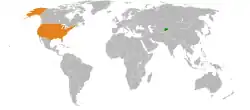Kyrgyzstan–United States relations
Kyrgyzstan – United States relations are bilateral relations between Kyrgyzstan and the United States.
 | |
Kyrgyzstan |
United States |
|---|---|
History
The U.S. government provides humanitarian assistance, non-lethal military assistance, and assistance to support economic and political reforms. It also has supported the Kyrgyz Republic's requests for assistance from international organizations. For example, the United States helped the Kyrgyz Republic accede to the World Trade Organization (WTO) in December 1998.[1]
Following 9/11, the U.S. has increased its interest in this part of the world, leading to divisions in opinion and welcome. The US opened the Transit Center at Manas in December 2001 following the 9/11 attacks. Both Russia and China were dismayed and in later years reportedly offered large bounties if Kyrgyzstan closed the base. In 2006, the President of Kyrgyzstan demanded further concessions to the agreement and in this year a US Air Force personnel officer was kidnapped (media later reported inconsistencies in this account; the USAF reconfirmed a kidnapping took place in 2012). 2006 also saw the killing of a Kyrgyz civilian wielding a knife by a US serviceman with a gun. Local Kyrgyz sentiment and media was outraged as the Kyrgyz region is plagued by lawlessness, banditry, and smuggling and the carrying or even threatening with a knife is relatively common in Kyrgyz street culture. For the Americans, still reeling and devastated from the 9/11 terrorist assault on their largest city, any forcible entry by a civilian into a military base can and is met with deadly force. The US military placed the serviceman under administrative punishment and an undisclosed financial settlement was made to the family.
.jpg.webp)
According to the 2012 U.S. Global Leadership Report, 34% of Kyrgyz people approve of U.S. leadership, with 43% disapproving and 23% uncertain.[2]
In July 2015, the Kyrgyzstan Ministry of Foreign Affairs ceased a bilateral cooperation treaty signed by the two countries in 1993, amidst protests by the Kyrgyz foreign ministry over the U.S. Department of State's decision to award the 2014 Human Rights Defender Award to Kyrgyz prisoner Azimzhan Askarov, a journalist and political activist who was arrested for his contributions in the 2010 South Kyrgyzstan ethnic clashes.[3] The U.S. has since warned Kyrgyzstan of the cancellation's consequences regarding the provision of humanitarian and security aid.[4] Three months later, U.S. Secretary of State John Kerry visited Kyrgyzstan in an effort to ease bilateral ties.[5]
U.S. assistance aids the Kyrgyz Republic in implementing necessary economic, health sector, and educational reforms, and supports economic development[6] and conflict resolution[7] in the Fergana Valley. Following the 2020-2021 withdrawal of United States troops from Afghanistan concerns were raised on the future of the United States engagement in Central Asia with Columbia University professor Alexander Cooley stating that U.S. in fact may be "freed from the political sensitivities of dealing with a client government" and therefore free for a more evenhanded approach to the region.[8]
Embassy
.jpg.webp)
The U.S. Embassy in the Kyrgyz Republic is located in Bishkek.[9]
Principal US Officials, as of 2022:
- Chargé d'Affaires – Sonata Coulter[10]
- Political-Economic Officer – Tom Selinger[11]
- USAID Director – Kaya Adams[12]
The Kyrgyz Embassy in the United States is located in Washington, D.C. As of 2023 the Kyrgyz ambassador to the United States and Canada is Bakyt Amanbaev.[13]
See also
References
- "Statement by U.S. Mission to the World Trade Organization Attaché Quentin Baird at the WTO Trade Policy Review of the Kyrgyz Republic". United States Trade Representative. Retrieved 2022-07-31.
- U.S. Global Leadership Project Report - 2012 Gallup
- "Kyrgyzstan Ends U.S. Cooperation Agreement Amid Human Rights Dispute". Radio Free Europe/Radio Liberty. July 21, 2015. Retrieved November 2, 2015.
- Solovyov, Dmitry (July 21, 2015). "Kyrgyzstan cancels cooperation treaty with United States". Reuters. Retrieved November 2, 2015.
- Clark, Dave (October 31, 2015). "US smooths Kyrgyzstan ties after rights row". Yahoo! News. Agence France-Presse. Retrieved November 2, 2015.
- Uzbekistan, U. S. Mission (2016-03-09). "USAID Helps Diversify International Export of Horticultural Products from Uzbekistan's Fergana Valley". U.S. Embassy in Uzbekistan. Retrieved 2022-07-31.
- "Focus on conflict prevention in Ferghana Valley". The New Humanitarian. 2004-07-22. Retrieved 2022-07-31.
- Cooley, Alexander (23 August 2021). "A Post-American Central Asia: How the Region Is Adapting to the U.S. Defeat in Afghanistan". Foreign Affairs. Retrieved 24 August 2021.
- reichardr. "Homepage". U.S. Embassy in The Kyrgyz Republic. Retrieved 2022-07-31.
- reichardr. "Charge d'Affaires ad interim Sonata Coulter". U.S. Embassy in The Kyrgyz Republic. Retrieved 2022-07-31.
- "Tom Selinger".
- reichardr. "Homepage". U.S. Embassy in The Kyrgyz Republic. Retrieved 2022-07-31.
- "Embassy of the Kyrgyz Republic in the USA and Canada". mfa.gov.kg. MFA of Kyrgyzstan. Retrieved 8 June 2023.
![]() This article incorporates public domain material from U.S. Bilateral Relations Fact Sheets. United States Department of State.
This article incorporates public domain material from U.S. Bilateral Relations Fact Sheets. United States Department of State.
External links
![]() Media related to Relations of Kyrgyzstan and the United States at Wikimedia Commons
Media related to Relations of Kyrgyzstan and the United States at Wikimedia Commons
